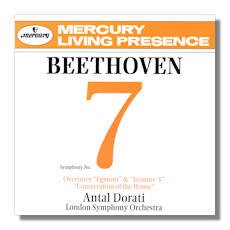
The Internet's Premier Classical Music Source
Related Links
- Beethoven Reviews
- Latest Reviews
- More Reviews
-
By Composer
-
Collections
DVD & Blu-ray
Books
Concert Reviews
Articles/Interviews
Software
Audio
Search Amazon
Recommended Links
Site News
 CD Review
CD Review
Ludwig van Beethoven

- Symphony #7 in A Major, Op. 92 (1812)
- Overture "Leonore" #3 in C Major, Op. 72a (1806)
- Overture "Egmont", Op. 84 (1810)
- Overture "Consecration Of The House", Op. 124 (1823)
London Symphony Orchestra/Antál Doráti
Mercury Living Presence 462958-2 ADD 73:19
Recorded in 1963 and finally remastered for CD in 1999, there's been a whole lot of Beethoven since Antal Dorati stood at the helm of the London Symphony Orchestra. As popular as this series was in the mid-to-late 1990s, I'm genuinely surprised at how few of these CDs are easily sourced. Of the three big box sets devoted to Mercury, only Volume 3 is readily available, and Universal doesn't have current plans to remedy that problem. Thus, finding this album might be akin to finding hidden treasure. I promise that the adventure is worth it.
Perhaps the one criticism one might levy at this disc is a certain lack of warmth. Dorati's Brahms and Dvořák were unmatched for earthy, rustic flair, but there was always good humor behind the razor-sharp rhythms. Here, that's less in evidence, though some listeners might prefer the pure excitement on display. Like most of his London Symphony records, there's a tremendous energy and purpose that courses through this disc like a blowtorch through butter. Dorati achieves this effect less through speed than a demand for accuracy and attention to detail. Sure, Karajan's contemporaneous reading with the celebrated Berlin Philharmonic scores over Dorati in terms of pure orchestral beauty but credit the latter for cleaner balances between sections and a closer identification (arguably) than one finds in Germany. The lower regions of the orchestra, which Karajan never paid much attention to as he aged, rumble proudly under the Hungarian's eagle eye. Pacing is very good, though modern listeners may find the approach too stately. However, "golden age" listeners or older collectors may find this a welcome corrective to say, Klemperer, whose three (!) Philharmonia readings strike me as progressively heavier and rhythmically slack.
The Seventh is obviously the main attraction, but the overture set is equally welcome and features the same positive qualities as the symphony. While not as fanatically precise as Szell, these are less old-fashioned than one might expect. Indeed, Dorati's dramatic timing and the orchestra's committed response elevate these incidental works beyond mere filler. Like all great conductors of his age, Dorati was an experienced man of the theatre, especially skilled in ballet. It comes as no surprise that he paces these overtures as well as anyone, and unlike his German colleagues, he avoids either heaviness (Bohm, in places) or slickness (Karajan, everywhere). Again, the string playing isn't the prettiest in town, but the woodwind solos are wonderful, and the collective effort is one of outstanding character and virtuosity. It almost goes without saying that the sound is first class for any era, and collectors and newcomers alike should welcome this with open arms. If you can find it, buy it!
Copyright © 2018, Brian Wigman


















